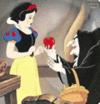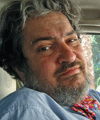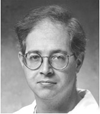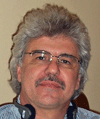 In anesthesiology, it is all too easy to lose oneself in the mechanics
of
placing an endotracheal tube, and to forget that, in the
extraordinary act of inducing a
trance-like state barely distinguishable from death in a fellow human
being, you are acting squarely within the realm
of myth. "Sleep and death are brothers" is an ancient Greek proverb,
and from the mythologic
perspective, is quite literally true. The god of Sleep, Hypnos is the
younger brother of the god of
death, Thanatos; both children of Nyx, the goddess of night. And
therein lies a glimpse at the
beauty of mythology and archetype; the blurring of the distinction
between what
is real, and what is metaphorically and romantically true or essential
(containing the essence of a thing). Our Western
penchant for deconstruction and de-mystification has the
unfortunate and unintended consequence of driving the essence of things
out of our daily lives. We slay beauty, the essence, with the real. A
beautiful fragrant climbing rose becomes trivialized and "understood"
as a biological device that uses sunlight to
fix atmospheric carbon as growth substrate, and the flower is an
attractant to
promote cross pollination; we have killed the essence of the rose and
replaced it with reality, to our great aesthetic detriment; in so
doing, we fall out of grace; we lose the Tao. Just so have we
trivialized the stupendous act of
conjuring a near death stupor in our fellow man, and than at our will,
performing a veritable resurrection; an Anastasis, in greek;
αναστασις; ανα
(ana) up and στασις
(stasis)
standing. This word, anastasis, by the way, bears a striking similarity
to anesthesia, and would have been familiar to a classically educated
scholar such as Oliver Wendell Holmes...
In anesthesiology, it is all too easy to lose oneself in the mechanics
of
placing an endotracheal tube, and to forget that, in the
extraordinary act of inducing a
trance-like state barely distinguishable from death in a fellow human
being, you are acting squarely within the realm
of myth. "Sleep and death are brothers" is an ancient Greek proverb,
and from the mythologic
perspective, is quite literally true. The god of Sleep, Hypnos is the
younger brother of the god of
death, Thanatos; both children of Nyx, the goddess of night. And
therein lies a glimpse at the
beauty of mythology and archetype; the blurring of the distinction
between what
is real, and what is metaphorically and romantically true or essential
(containing the essence of a thing). Our Western
penchant for deconstruction and de-mystification has the
unfortunate and unintended consequence of driving the essence of things
out of our daily lives. We slay beauty, the essence, with the real. A
beautiful fragrant climbing rose becomes trivialized and "understood"
as a biological device that uses sunlight to
fix atmospheric carbon as growth substrate, and the flower is an
attractant to
promote cross pollination; we have killed the essence of the rose and
replaced it with reality, to our great aesthetic detriment; in so
doing, we fall out of grace; we lose the Tao. Just so have we
trivialized the stupendous act of
conjuring a near death stupor in our fellow man, and than at our will,
performing a veritable resurrection; an Anastasis, in greek;
αναστασις; ανα
(ana) up and στασις
(stasis)
standing. This word, anastasis, by the way, bears a striking similarity
to anesthesia, and would have been familiar to a classically educated
scholar such as Oliver Wendell Holmes...
It is time to
re-mystify anesthesiology. I do not seek this at the expense of
classical understanding. My  objective is to restore some reverence and awe in
our minds for what we do, and respect for those who afford us the opportunity; our patients. I am
reminded of one of my heroes, Dr. Paul Farmer, who when he was thanked
for taking care of somebody, reportedly looked heavenward and said "it
is a privilege to be able to do so." Just so. We can and must
understand anesthesiology as both a science, and as a a compassionate (and mystical) art if we are to have full and meaningful practices.
objective is to restore some reverence and awe in
our minds for what we do, and respect for those who afford us the opportunity; our patients. I am
reminded of one of my heroes, Dr. Paul Farmer, who when he was thanked
for taking care of somebody, reportedly looked heavenward and said "it
is a privilege to be able to do so." Just so. We can and must
understand anesthesiology as both a science, and as a a compassionate (and mystical) art if we are to have full and meaningful practices.
In this intention to evoke the mystical and mythic, I am informed and inspired by the great archetypal psychologist James Hillman. He captures this notion better than I;
My war - and I have yet to win a decisive battle - is with the modes of thought and conditioned feelings that prevail in psychology and therefore also in the way we think and feel about our being. Of these conditions none are more tyrannical than the convictions that clamp the mind and heart into positivistic science (geneticism and computerism), economics (bottom-line capitalism), and single-minded faith (fundamentalism). (The Force of Character, 1999, p. xxiv.)
The
soul of anesthesiology, its essence, is certainly related to the
technical execution, the praxis, of anesthesia, just as the essence of
a rose ultimately depends upon photosynthesis. But, like that rose,
anesthesiology is more than the sum of its theoretical and technical
particulars. When Gertrude Stein said, "A rose is a rose is a rose,"
she was arguing that the essence of a rose was understandable through
 the senses, without deconstructive explanations. I feel that way about
anesthesiology; its mystery and compassionate beauty are a part of who
I am, and until now, has required no explanation. However, I can't
help but feel that the effort to articulate how many of us feel about
our calling might be useful to others, and is certainly good for me.
the senses, without deconstructive explanations. I feel that way about
anesthesiology; its mystery and compassionate beauty are a part of who
I am, and until now, has required no explanation. However, I can't
help but feel that the effort to articulate how many of us feel about
our calling might be useful to others, and is certainly good for me.
There is no question that our academic anesthesia departments are the incubators of our anesthesiology culture and the Arks in which we carry the essence of anesthesiology forward. Reves in his 2006 Rovenstine lecture, and Evers and Miller in their response in Anesthesiology, addressed and debated their perceived "crisis" in academic anesthesiology. These are all good men, chairmen and deans, men of analysis and action. In conducting this public discussion, they have walked that classical, deconstructive "real" road and are proposing concrete solutions. And this must proceed. At the same time, another set of discussions ought to be taking place. What does it mean to be an anesthesiologist in this age where every ICU nurse has access to a diprivan drip and vial of vecuronium, and every ER physician thinks nothing of a bolus of diprivan and versed as a prelude to cardioversion or shoulder relocation ("npo? we don't need no stinking npo!") To be sure, anesthesia as an art will not die; the future of anesthesiology is less certain...
If we need a muse to help us touch the mythic in anesthesiology, we need look no further than our patients. These souls come to us with innocent trust ("what are you going to use, doc?") of such depth that they willingly bite of the apple proffered by us, total strangers, knowing that indeed, the fruit is poisoned, secure in the certainty that we will not abandon them. Why do they do this? It's not because they're stupid or naive. They do this because we fill archetypal roles for them as anesthesiologists; therein lies mystery enough for anyone...
 Mitch Keamy is an anesthesiologist in Las Vegas Nevada
Mitch Keamy is an anesthesiologist in Las Vegas Nevada
 Andy Kofke is a Professor of Neuro-anesthesiology and Critical Care at the University of Pennslvania
Andy Kofke is a Professor of Neuro-anesthesiology and Critical Care at the University of Pennslvania
 Mike O'Connor is Professor of Anesthesiology and Critical Care at the University of Chicago
Mike O'Connor is Professor of Anesthesiology and Critical Care at the University of Chicago
 Rob Dean is a cardiac anesthesiologist in Grand Rapids Michigan, with extensive experience in O.R. administration.
Rob Dean is a cardiac anesthesiologist in Grand Rapids Michigan, with extensive experience in O.R. administration.
Very nice. It's almost incompatible with action: realizing at some level what it is we do ought to be nearly paralyzing (well, what you do IS). The disconnect between the need nearly to take it for granted in order to do it without being dumb-struck, and the the truly awesome thing it is -- there's something incomprehensible there. Still, like you, I find it necessary once in a while to take full account of it and just let myself be amazed.
The juxtaposition of "sleep and death" reminds me of a thing (calling it a "round" seems too mundane, and I'm not enough of a music scholar to know if there's another term) I used to sing with four friends, a five-part "rondo?," the words to which are "Death is a long long sleep/ sleep is a short short death/ that softens but death ends life's grief/ death is a long long sleep." Grim, but it sounds really great when sung properly.
Posted by: Sid Schwab | July 14, 2024 at 10:13 AM
A beautiful meditation on our art/science, which is indeed a blend of logic, aristry, and an almost mystical trust - dare I say, faith. Nice for us fellow-anesthesiologists once in a while to know of others taking the same leap of faith every day!
Posted by: T. | July 14, 2024 at 12:16 PM
There is no real similarity between "anastasis" and "anesthesia." "Anesthesia" is a combination of the privative "an" and "aesthesis," meaning "perception."
Posted by: Paul Axelrod | July 20, 2024 at 04:56 PM
Yes, of course, from an etymological perspective; Anesthesia lore/history has Oliver Wendell Holmes naming the art/specialty based upon those roots; "without perception" as you say. I simply muse from a poetic perspective, that if you speak out loud "anesthesia" and "anastasis" they have a very similar phonetic sound, something that the erudite Holmes might have reasonably noted as a clever coincidence; a "pun" as it were. Just conjecture, of course, I am not aware of any historical evidence; it's just a fancy...
Thanks, by the way, for your comment!
Mitch
Posted by: mkeamy | July 20, 2024 at 05:29 PM
I LOVE this post! It explores the spiritual and trust issues in anesthesia, just as we do with sleep at our site, SleepCompass.com It used to be medicine was a matter of trust and admiration, people looked up to workers in the medical field for having a calling that was composed of life and death and compassion. So many of us are disheartened with the turn of insurance companies dictating medical care and the 'I'll sue you!' attitude of much of the public. So instead of throwing the baby out with the bath water, we too have looked inward to the basic elements of healthcare and of human beings. Trusting another to care for us.
Sweet Dreams- Jane
Posted by: Jane | August 23, 2024 at 08:13 PM
My efforts to demystify death brought me to your post calling for a remystification of anethesiology. Reinvigorating what we do with a dose of wonder is always a good thing, and I'm not even an anethesiologist. I am, however, an instructional technologist developing an online course abour death. I'd like to interview you. Would you be interested?
- Tom
Posted by: tom | February 26, 2024 at 07:46 PM
Dear Tom. What an intriguing job description and task. I'd love to chat; contact me at [email protected] and let's find a mutually convenient time...
Posted by: Mitch Keamy | February 28, 2024 at 08:53 AM
This is my goal too, to restore some reverence and awe in our minds for what we do, and respect for those who afford us the opportunity; our patients.
Sam Nisbett
Posted by: cpap | March 01, 2024 at 04:16 AM
is very interesting information in this article .. I quite like mythology ... amazes me to see the similarity between sleep and death ... may be completely the same! only when we sleep we wake again .. death is not returned ever!
Posted by: collector baseball cards | May 07, 2024 at 07:16 AM
I love snow_white, what a great story!!!
Posted by: orexis online | May 18, 2024 at 08:20 AM